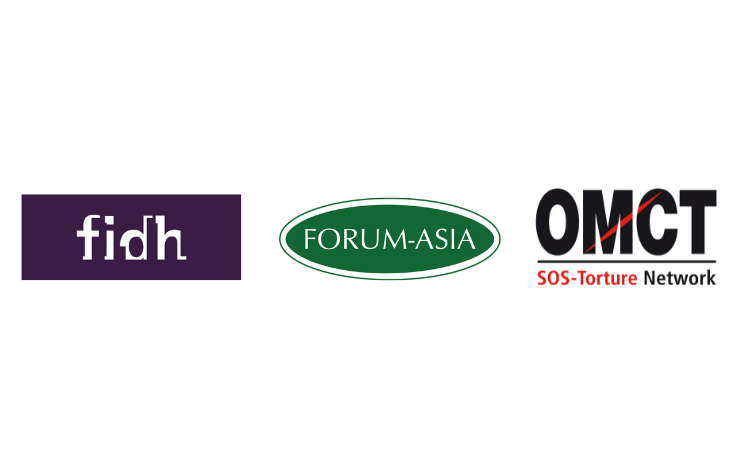Bangkok, Geneva, Paris, 10 September 2021: FIDH, FORUM-ASIA, and OMCT condemn the serious human rights violations committed by Indian government authorities in Kashmir following the death of Kashmiri leader Syed Ali Shah Geelani on 1 September 2021. The three organizations also condemn the imposition of restrictions that are inconsistent with the country’s international human rights obligations and urge the Indian government to end all acts of harassment against Mr. Geelani’s family members.
As the news of Syed Ali Shah Geelani’s death broke on the night of 1 September, police and military forces blocked all roads and other access routes leading to Mr. Geelani’s home in Srinagar. The security forces also prevented media workers from reaching Mr. Geelani’s home. Family members said police removed Mr. Geelani’s body from his home, which prevented his family and other relatives from performing his final rites, including funeral prayers and the burial in accordance with Islamic practice.[1] According to family members, in the early hours of 2 September, the police hastily buried Mr. Geelani at a graveyard near his home – an act that was against the leader’s wishes, as he wanted to be buried in the Martyrs Graveyard in Eidgah, Srinagar, nearly nine kilometers from his home. No relatives of Mr. Geelani were allowed to attend his burial, which took place under a massive presence of security forces. On 5 September, 2021, police in Srinagar filed a first information report (FIR) against an unknown number of Mr. Geelani’s family members under the repressive Unlawful Activities Prevention Act (UAPA).[2] Police accused them of shouting anti-India slogans and draping Mr. Geelani’s body in a Pakistani flag after his death.
Following the news of Mr. Geelani’s death, authorities shut down mobile phone networks and all internet services in the Kashmir valley. While broadband internet services and mobile phone networks were restored in the Kashmir valley in the evening of 3 September, mobile internet services remained suspended in most districts until 6 September, except for Srinagar and Budgam Districts, where curbs were lifted in the evening of 7 September. The communication blockade made it difficult for the people to access healthcare and other essential services in the region.[3] The frequent communication blockades that have been imposed in Kashmir since August 2019 have been widely condemned locally and internationally. In August 2019, five United Nations (UN) human rights experts described the communication shutdown as “collective punishment.”[4]
While no curfew was officially declared, authorities also imposed blanket restrictions on freedom of movement and peaceful assembly in the Kashmir valley until 5 September. On the evening of 2 September, security forces fired tear gas to disperse a crowd of about 300 people who had assembled in the Nawabazar area of Srinagar.[5]
FIDH, FORUM-ASIA, and OMCT condemn the violations of the rights to freedom of expression, freedom of peaceful assembly, freedom of movement, and freedom of religion or belief. The three organization urge the Indian government to ensure the people of Kashmir can exercise their legitimate rights in accordance with the human rights treaties to which India is a state party.
Background
At around 10 pm on 1 September 2021, Syed Ali Shah Geelani passed away after a prolonged illness at his home in the Hyderpora area of Srinagar, Jammu and Kashmir. He was 91 years old. Mr. Geelani had been under house arrest in Hyderpora for the past 11 years.
Born on September 29, 1929 at Zurmanz, a small village in the Bandipora District of the Kashmir valley, Syed Ali Shah Geelani was a member of the All Parties Hurriyat Conference (APHC), a coalition of several pro-freedom parties and groups in Jammu and Kashmir. Mr. Geelani stood for the right to self-determination of the people of Kashmir under the auspices of the UN. He consistently rejected direct talks with the Indian government unless it formally accepted Kashmir as a “disputed territory.” His staunch stance on Kashmir, for which he was jailed several times by the Indian government, earned him mass support in the region. Following a rapid deterioration in his health in June 2020, Mr. Geelani resigned from active political life as well as from APHC.
Mr. Geelani’s death under detention is the second such death of a prominent pro-freedom Kashmiri leader in the last four months. Earlier this year in May, the incarcerated Tehreek-i-Hurriyat chairman and pro-freedom leader, Muhammad Ashraf Sehrai, 78, died at a hospital in Jammu, where he was shifted from Udhampur jail after complaining of severe respiratory illness. Mr. Sehrai was serving detention under the repressive Public Safety Act (PSA) since July 2020 at a jail in Jammu, nearly 300 kilometers away from his home.[6] Like Mr. Geelani, Mr. Sehrai’s funeral was also held in the dead of the night under a huge presence of police and military forces. Sehrai’s family alleged that the leader was not allowed to buried in Srinagar, where the family has lived for many decades.[7]
[1] https://kashmirreader.com/2021/09/05/geelanis-sons-say-went-searching-for-fathers-grave-in-the-morning/
[2] https://timesofindia.indiatimes.com/india/fir-against-geelanis-family-for-raising-anti-national-slogans-putting-pakistan-flag-on-his-body/articleshow/85934668.cms
[3] https://www.instagram.com/tv/CTXN15GBAtJ/?utm_source=ig_web_copy_link
[4] https://news.un.org/en/story/2019/08/1044741
[5] https://freepresskashmir.news/2021/09/02/clashes-reported-in-srinagar-following-geelanis-death/
[6] https://economictimes.indiatimes.com/news/india/hurriyat-leader-ashraf-sehrai-dies-in-detention-buried-in-lolab-of-kashmir/articleshow/82423898.cms
[7] https://indianexpress.com/article/india/sehrai-buried-in-ancestral-village-kin-say-cops-did-not-allow-burial-in-srinagar/
**
Click here for the PDF version of the statement
For further information, please contact:
- South Asia Programme, FORUM-ASIA, [email protected]
For media inquiries, please contact:
- Melissa Anathraj, Communication and Media Programme, FORUM-ASIA, [email protected]



